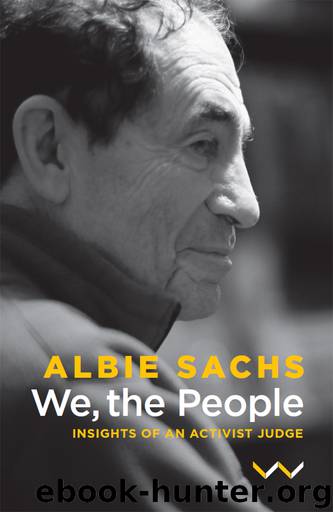We the People by Sachs Albie

Author:Sachs, Albie
Language: eng
Format: epub
Publisher: Wits University Press
Published: 2016-01-13T16:00:00+00:00
Equality Jurisprudence: The origin of doctrine in the South African Constitutional Court
10TH MCDONALD LECTURE | CENTRE FOR CONSTITUTIONAL STUDIES, UNIVERSITY OF ALBERTA | CANADA | 1998
Mr Hugo [President of the Republic of South Africa v Hugo (CCT 11/96) [1997] ZACC 4; 1997 (4) SA 1 (CC); 1997 (6) BCLR 708 (CC)] was aggrieved. While sitting in prison near Durban he got to know that the newly inaugurated president, Mr Nelson Mandela, had issued what was called a ‘Presidential Act’ ordering the release of disabled people, children under a certain age, and mothers of children under 12. Mr Hugo said (after taking legal advice): ‘I have a child under 12, whose mother is dead. Why have I been left out? That’s discrimination, a violation of my rights under Section 8 of the Bill of Rights in South Africa’s new Constitution’.
Mr Prinsloo [Prinsloo v Van der Linde (CCT 4/96) [1997] ZACC 5; 1997 (3) SA 1012 (CC); 1997 (6) BCLR 759 (CC)] was a farmer, five hundred miles away, and he was also aggrieved. A fire had spread from his land on to a neighbour’s property, causing extensive damage. The Forestry Act said that if you lived in a ‘non-fire controlled zone’, which he happened to do, and fire spread from your land and caused damage to a neighbour’s property, you had to prove that you had not been negligent. Mr Prinsloo alleged that putting the onus on him was a denial of his right to equality under Section 8. ‘Why should I be treated differently from people in fire-controlled zones?’ he asked (after getting a legal opinion).
These cases happened to reach the Constitutional Court at roughly the same time, and in the same way that jurisprudence sometimes has, two people who were never to meet became close accomplices in the evolution of basic doctrine. In the words of Justice Cardoso, ‘The sordid controversies of litigants are the stuff out of which great and shining truths will ultimately be shaped. The accidental and transitory will yield the essential and the permanent’. So it came about that hearing these two cases in near conjunction compelled our Court to reflect on what the equality principle in our new Bill of Rights was all about. Who should be safeguarded by it? What kinds of legislation or executive action should raise questions of viewing equal protection not just as a ‘good thing’, but as a fundamental human right?
We began the search for answers, as our Bill of Rights encourages us to do, with a look at international jurisprudence on the question. In general terms, in interpreting our Bill of Rights we are required to apply the principles and promote the values of an ‘open and democratic society based on freedom and equality’. We were trying to find basic principles, an approach, a perspective, which would guide us in our quest to protect fundamental human rights and enable us to do so in a manner which resonated with our Constitution and our historical circumstances.
A more profound contrast
Download
This site does not store any files on its server. We only index and link to content provided by other sites. Please contact the content providers to delete copyright contents if any and email us, we'll remove relevant links or contents immediately.
| Arms Control | Diplomacy |
| Security | Trades & Tariffs |
| Treaties | African |
| Asian | Australian & Oceanian |
| Canadian | Caribbean & Latin American |
| European | Middle Eastern |
| Russian & Former Soviet Union |
The Secret History by Donna Tartt(19090)
The Social Justice Warrior Handbook by Lisa De Pasquale(12190)
Thirteen Reasons Why by Jay Asher(8912)
This Is How You Lose Her by Junot Diaz(6887)
Weapons of Math Destruction by Cathy O'Neil(6281)
Zero to One by Peter Thiel(5802)
Beartown by Fredrik Backman(5755)
The Myth of the Strong Leader by Archie Brown(5508)
The Fire Next Time by James Baldwin(5446)
How Democracies Die by Steven Levitsky & Daniel Ziblatt(5219)
Promise Me, Dad by Joe Biden(5154)
Stone's Rules by Roger Stone(5088)
A Higher Loyalty: Truth, Lies, and Leadership by James Comey(4964)
100 Deadly Skills by Clint Emerson(4926)
Rise and Kill First by Ronen Bergman(4789)
Secrecy World by Jake Bernstein(4753)
The David Icke Guide to the Global Conspiracy (and how to end it) by David Icke(4720)
The Farm by Tom Rob Smith(4514)
The Doomsday Machine by Daniel Ellsberg(4490)
